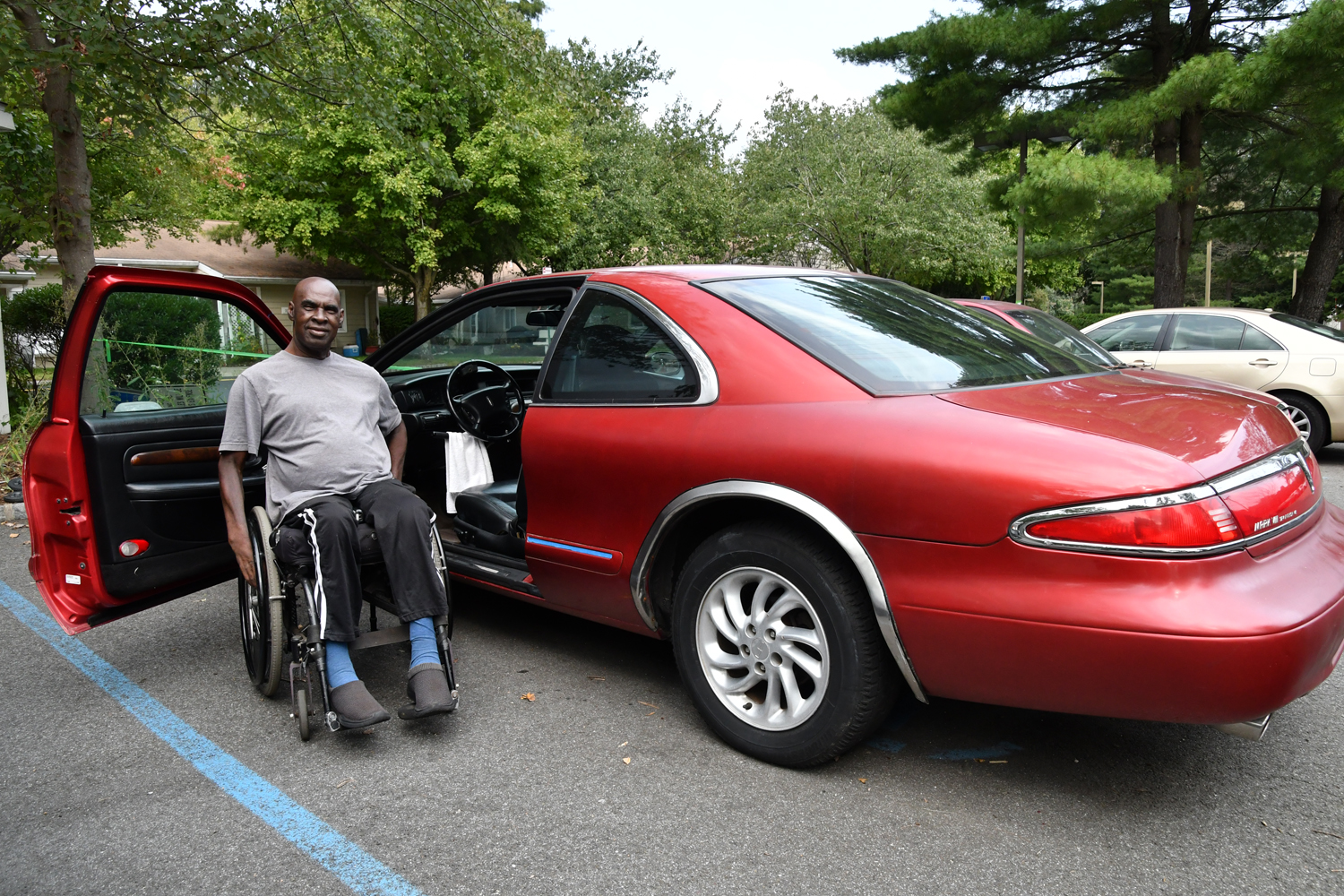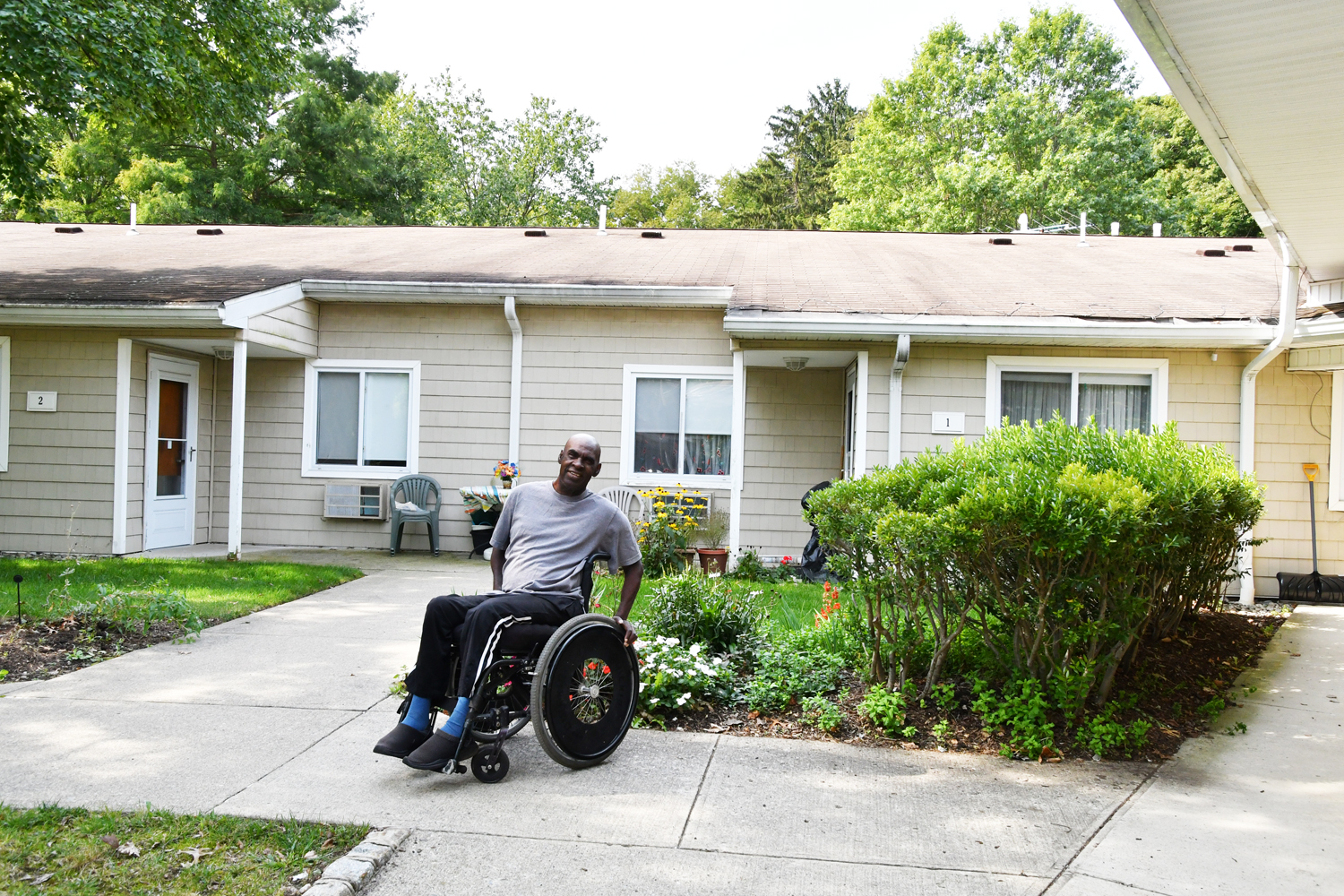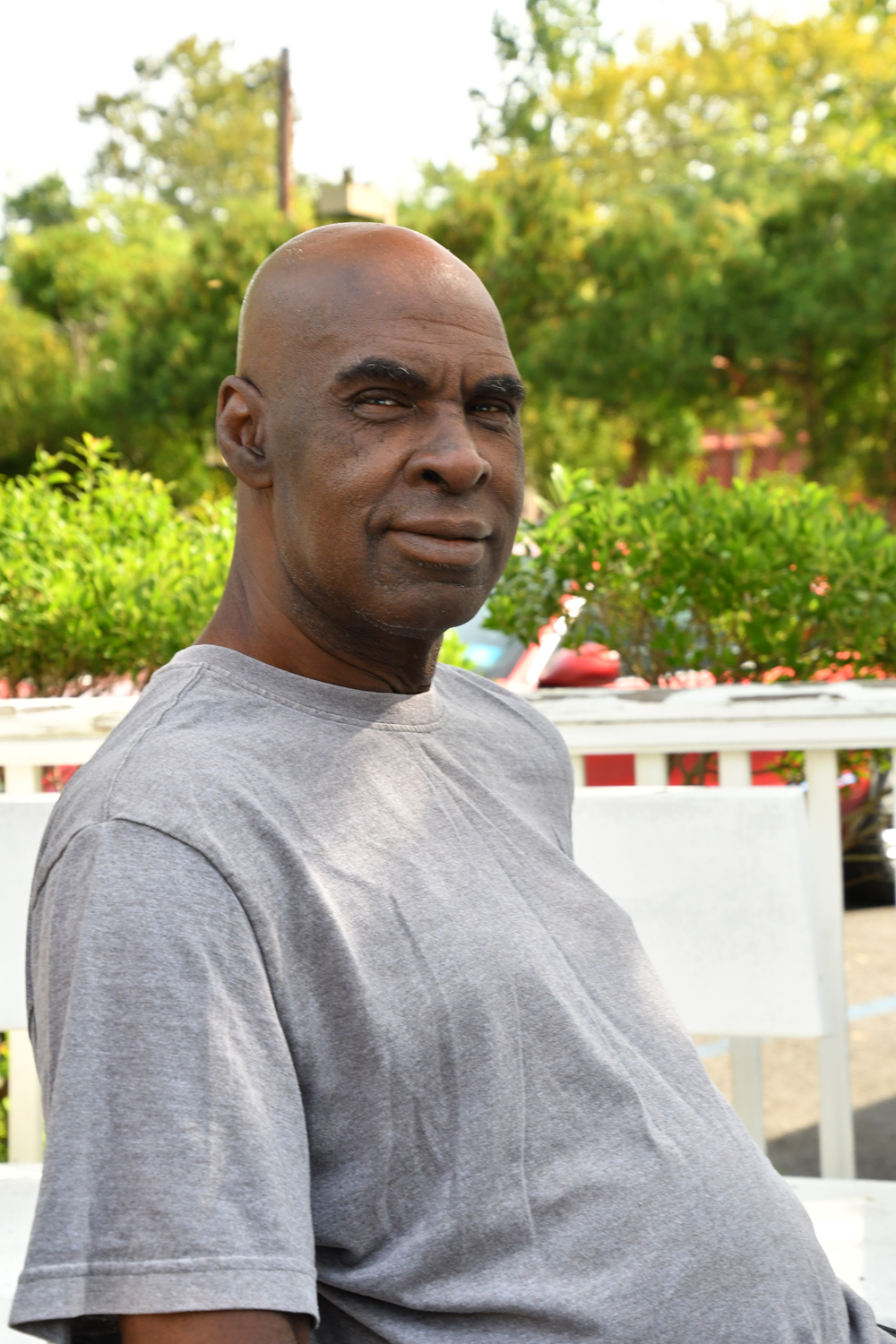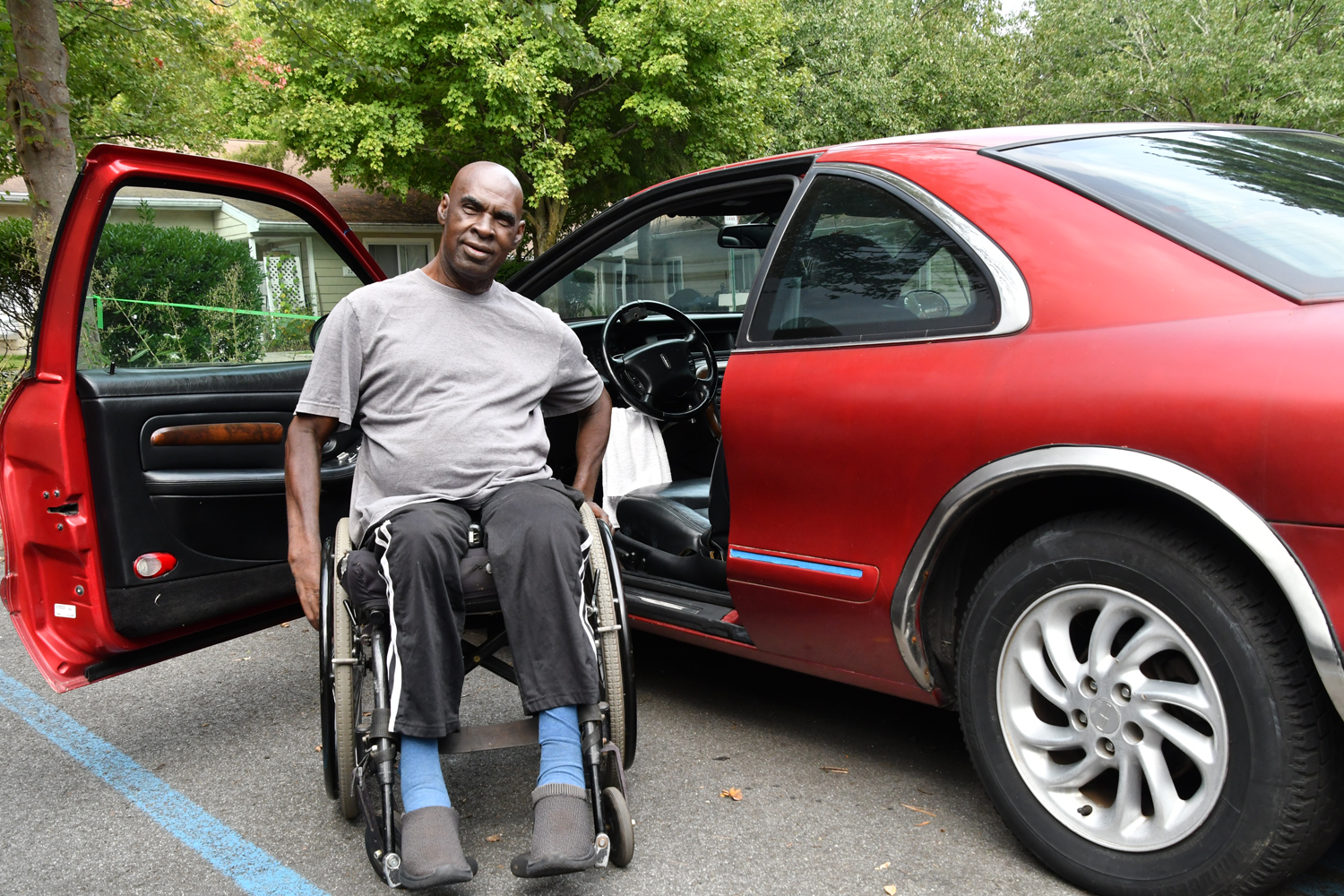“When worlds collide” always comes to mind whenever I see a wheelchair bound individual poised at a crosswalk on a busy street. In my town I have observed this scene with considerable frequency over the years. Gutsy men and women in electric wheelchairs mixing with other pedestrians offer a relatively common sight around my town. (People in motorized wheelchairs are considered pedestrians by law). I finally decided to find out their story. Many stories awaited me, all touching and many inspiring. None more so than that of Charles Ward.
Meet Charles Ward.
Mobility Matters, Navigating Life in a Wheelchair

Charles loves his Lincoln
Created as a dedicated facility for wheelchair bound but self sufficient individuals, Lehman Gardens in Park Ridge, New Jersey has served disabled men and women since the 1980s. Here 36 modest individual apartments sit nicely spaced in a landscaped setting enhanced with flowered walks and curved paths. My first time entering the parking lot I knew nothing about Lehman Gardens not even its name. That would soon change. I met Ed and Mike.
Taking advantage of the beautiful late summer day, Ed a burly congenial man in a Harley-Davidson T-shirt welcomed me with a smile. His openness immediately relieved me of any self consciousness I might harbor in asking questions of a disabled person about mobility. Seated in his electric wheelchair Ed projected the persona of a man of years eminently capable as a craftsman and absolutely not afraid to get his hands dirty. Ed had one leg. His disability certainly did not limit his passion for motorcycles and big block Mopars. Ed knew his stuff. To Ed’s side I met Mike. Quick to laugh, Mike a long time resident with an updated Haight-Ashbury look had been disabled by a stroke at the age of three. I recognized Mike as one of the brave souls who ventured forth in his wheelchair to travel the half mile or so to downtown.
As a side bar for the gearheads out there, top speed for a standard electric wheelchair ranges from 5 mph to 8 mph depending on class. To answer the question I am confident some Drivin’ News readers stand poised to ask, I say, yes. There is an electric wheelchair land speed record. Full credit goes to Jason Liversidge, an Englishmen, avid adventurer, adrenaline junkie, married father of two and a quadriplegic. Though paralyzed from the neck down, Liversidge set the world record of 66.826 mph (107.546 km/h) in 2020 during the Straightliners Speed Weekend, held at England’s Elvington airfield. He set the Guinness record using only the motion of his head to control the record setting electric mobility-vehicle. Now back to Lehman Gardens.

Charles at Lehman Gardens
As Ed and I spoke he made it clear that the best person with whom to speak would be another resident, Charles. As if on cue a gentleman in an electric wheelchair came rolling up on one of Lehman Gardens neatly groomed concrete paths. His left arm hooked around a vertical bar on the wheelchair’s seat back. It appeared to provide stability for a torso that seemed twisted in an uncomfortable curl. Bright and engaging he projected the spirit and energy of a man younger than what I would learn to be his 65 years. Upon Ed’s urging the man introduced himself as Henry Charles Ward. He made clear he preferred to be called Charles. Accompanying his introduction he offered an outstretched hand. The hand, though proffered with rigid fingers and limited mobility, somehow succeeded in conveying sincerity and conviction.
Easy to speak with and disarmingly honest Charles indeed provided a special person with whom to discuss the challenges, lessons and life journey experienced in a wheelchair. Born in Alabama before moving to Newark, NJ, Charles at the age of 23 experienced the misfortune that would demand his remaining years be spent in a wheelchair. I did not explore his misfortune. He wisely noted that little would be gained by looking back when all of life’s remaining good stuff lay ahead.
Indeed, while Charles’ body exists relegated to a wheelchair his spirit soars without bounds.
Early in our conversation Charles expressed a passionate desire to relate the story of Lehman Gardens and in so doing inadvertently reveal much about the man into whom he had grown over his 40 years as a resident of Lehman Gardens.
Charles says, “It all began with a devoted family, their beloved son, a compassionate church, a willing town, a supportive county and a terrible accident. Over 40-years ago a local family, the Lehmans experienced a horrific tragedy. Their son, Tom, suffered a terrible spinal cord injury that left him a quadriplegic. Though paralyzed from the neck down, Tom craved independence. As a lifelong member of the local Our Lady of Mercy Catholic Church, Tom approached the church with the idea of creating a facility dedicated to providing a place where wheelchair bound individuals could live independent lives. He advocated for the Church to donate a parcel of land it owned as the site. The church leadership and congregation embraced the idea and donated the property. Then Tom’s plan needed an organization to run the facility. The county housing authority stepped to the plate and agreed to oversee what many believe to be the first facility dedicated to providing a place for young self-sustaining wheelchair bound individuals to live independent lives. Charles with a clear expression of pride says, “The concept caught fire and over the coming years spread worldwide.”
Lehman Gardens, in focusing on independence does not provide care giving staff. Residents need to have a home health aide or family member to provide assistance when needed.
Charles echoed the sentiments of other residents with whom I spoken, such as Ed, when Charles said, “This is the most wonderful blessing that could ever be offered to a wheelchair bound person, whether you’re coming from a nursing home or from your parents home. Young Tom Lehman used to live with his parents, but he wanted to be independent. It’s a blessing from the town of Park Ridge and from the church for the residents to be able to do this.”

Lehman Gardens’ wheelchair bound residents’ in their demonstrated passionate desire for independence leave no doubt as to how much they appreciate their benefactors who aid in overcoming life’s everyday challenges. Charles says, “Our home town here of Park Ridge has helped a lot by providing sidewalks that assist in promoting our mobility.” Charles goes on to recognize the town and the local Rotary Club. He says, “They built a bridge that allowed us to visit the local baseball field.” Local police and friends of Charles created a GoFundMe effort that enabled him to achieve the ultimate mobility, buy a car he could drive. More about that later.
At age 22 Charles faced life as a healthy, vigorous and strong young man. At 23 an accident changed his life profoundly. Few believed Charles would long survive the severe injuries he had sustained. Charles says, “With the grace of God, when you are down, you have no other choice but to get up.”
When Lehman Gardens first got off the ground in the mid-1980s Charles at the age of 23 found himself basically homeless, physically disabled and wheelchair bound. He had become acquainted with Tom Lehman through a local community college. Charles says, “I called Tom up and told him my story.” Charles spoke with Tom. He interviewed with the church. They welcomed him as a resident in the Lehman Gardens’ experiment. Almost forty years later both Lehman Gardens and Charles have grown to benefit those with whom they connect. Charles who today provides the voice of Lehman Gardens tells a powerful story of how Lehman Gardens changed his life. Charles recalls a life altering dream he had. Charles says, “In my dream Tom Lehman tells me that I want you to talk to people and talk about this place but mention my name. I started crying. I said I can’t do that. He said don’t worry. I will provide the words and help you. Sure enough, Tom Lehman died and the people from the town and people that I know, people from government and Congress, they all came to me and started talking to me. And I don’t know what happened, but the words just start coming out of my mouth. And I’ve been talking ever since. Charles caps his recollection with a smile saying, “As you may have noticed.” Indeed Charles stands as a most eloquent and passionate advocate for Tom Lehman and his concept of independence for the disabled.”
Charles now serves as a powerful advocate for promoting independence for the disabled across the county and state. When asked as to what society in general may not understand or appreciate about those in his situation, Charles says, “Don’t take anyone for granted. Just because they have a disability doesn’t mean that they don’t have a sound mind. The mind is a powerful thing that can go anywhere or do anything as witness by myself and other residents. When I found myself in a wheelchair, I thought my life was over. Then I realized that the only thing holding me back was my mind. So society has to appreciate that the mind is the most powerful thing.” Which brings us back to Charles and his car.
When asked what having a car means to a disabled person such as himself Charles says, “Oh Lord. When I was in rehabilitation at Kessler, the first thought on my mind was independence. I knew I had to learn to drive. So through Kessler Rehabilitation I worked hard and took my driver’s test to make sure that when I got out of rehab I could get around. Leaving Kessler I had been approved to drive a vehicle outfitted for someone with my disability.”

With a big smile Charles asks if I would like to see his car. I eagerly accepted. As noted earlier Charles had acquired it with the support of the local police, fiends and strangers on GoFundMe. Following Charles as he motors across the parking lot, I am brought to a 1997 Bright Toreador Red Metallic Lincoln MK VIII. Smiling proudly Charles says, “I take pride and joy in my Lincoln.” It had gotten a lot of respect from the automotive press when new. Certainly far more than the Lincoln Town Car. Edmunds wrote, “Under the skin, the Mark VIII is unbeatable, and we think that buyers who like the styling of the Mark VIII will enjoy this quick, competent luxury coupe for many years to come.” Clearly Charles does.
Charles acknowledges that he does not drive as much as he used to because he no longer parties like he used to. When I ask where he used to party, I realize that I knew Charles from years back when I partied on much the same circuit. I now recall a party animal in a wheelchair busting some two wheel moves on the dance floor. We recall those days and smile and laugh.
I ask Charles if he will pose by his Lincoln for a photo. He flashes a big smile and asks if he can have a copy. No problem.
Charles loves his Lincoln and his independence.

Heart warming story Burton. The Lincoln brought back memories of my Mark VII LSC. I cried when someone side swiped its glistening chrome heated and remote mirror. I was just out of college and that fix was my European travel money I had saved. In the end it would have been cheaper to go to Europe!! Lol
A great funny and probably true recollection. Thanks for sharing.